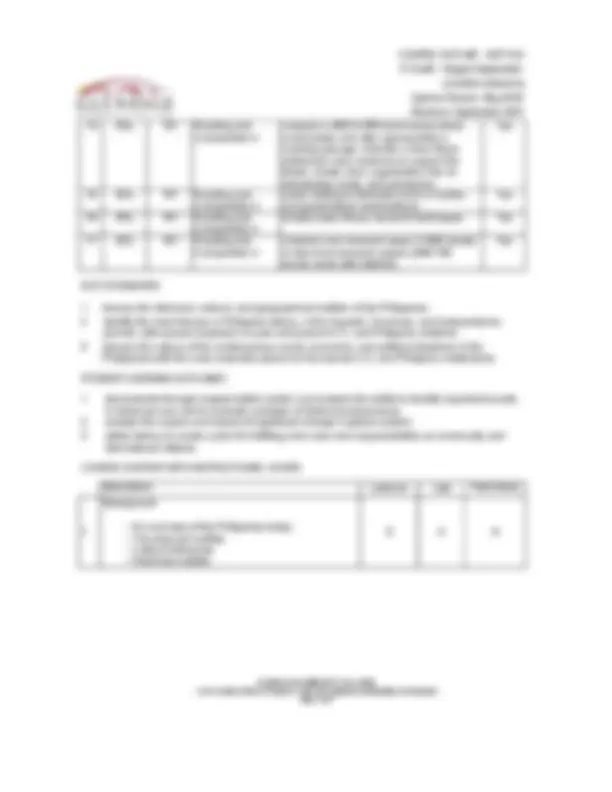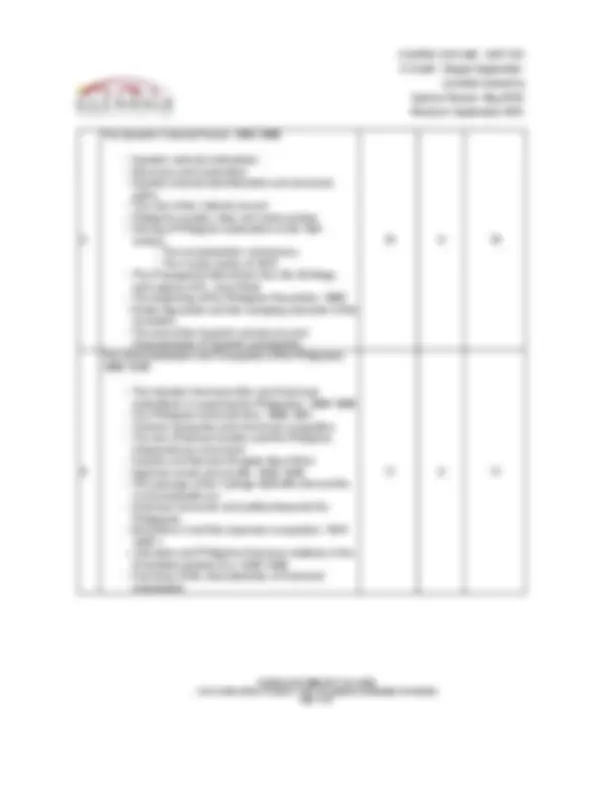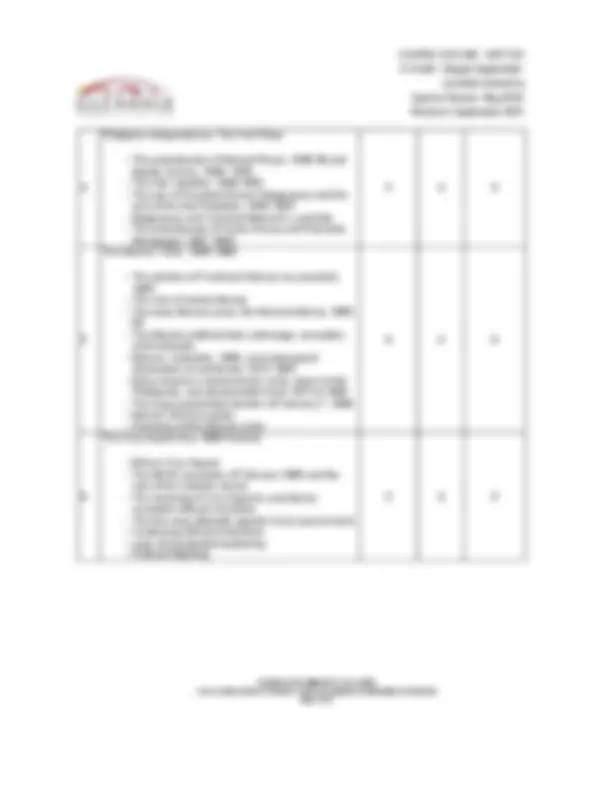





Study with the several resources on Docsity

Earn points by helping other students or get them with a premium plan


Prepare for your exams
Study with the several resources on Docsity

Earn points to download
Earn points by helping other students or get them with a premium plan
Community
Ask the community for help and clear up your study doubts
Discover the best universities in your country according to Docsity users
Free resources
Download our free guides on studying techniques, anxiety management strategies, and thesis advice from Docsity tutors
An outline for the History of the Philippines course (HIST 132) offered at Glendale Community College. The course covers the geographical, cultural, and historical realities of the Philippines from the Spanish colonial period to the present, with a focus on U.S.-Philippine relations and contemporary social, economic, and political situations. Students are required to meet specific entry and exit standards and demonstrate learning outcomes related to historical analysis, understanding causes and impact of significant change, and utilizing history for civic responsibilities.
What you will learn
Typology: Lecture notes
1 / 7

This page cannot be seen from the preview
Don't miss anything!




D Credit – Degree Applicable COURSE ID 004114 Cyclical Review: May 2018 Revision: September 2021
GLENDALE COMMUNITY COLLEGE --FOR COMPLETE OUTLINE OF RECORD SEE GCC WEBCMS DATABASE--
COURSE DISCIPLINE :
COURSE NUMBER :
COURSE TITLE (FULL) :
COURSE TITLE (SHORT) :
HIST
132
History of the Philippines
History of the Philippines
ACADEMIC SENATE DISCIPLINE: History
CATALOG DESCRIPTION
HIST 132 examines the geographical, cultural, and historical realities of the Philippines from the Spanish colonial period until the present. Particular emphasis is given to past and present U.S.- Philippine relations and the contemporary social, economic, and political situation in the Philippines.
Total Lecture Units:3.
Total Laboratory Units: 0.
Total Course Units: 3.
Total Lecture Hours:54.
Total Laboratory Hours: 0.
Total Laboratory Hours To Be Arranged: 0.
Total Contact Hours: 54.
Total Out-of-Class Hours: 108.
Recommended Preparation: ENGL 100 or ESL 151.
D Credit – Degree Applicable COURSE ID 004114 Cyclical Review: May 2018 Revision: September 2021
GLENDALE COMMUNITY COLLEGE --FOR COMPLETE OUTLINE OF RECORD SEE GCC WEBCMS DATABASE--
ENTRY STANDARDS
Subject Number Title Description Include 1 ENGL 100 Writing Workshop Read, analyze, and evaluate contemporary articles and stories to identify topic, thesis, support, transitions, conclusion, audience, and tone;
Yes
2 ENGL 100 Writing Workshop read, analyze, and evaluate contemporary articles and stories for the comprehension of difficult content and the identification of main ideas and (topic-based) evidence;
Yes
3 ENGL 100 Writing Workshop read, analyze, and evaluate student compositions for unity, development, use of evidence, interpretation, coherence, and variety of sentence form;
Yes
4 ENGL 100 Writing Workshop write a summary of a contemporary article or story with correct citation techniques;
Yes
5 ENGL 100 Writing Workshop write an argumentative essay that has an introduction, body paragraphs, and a conclusion, demonstrating a basic understanding of essay organization;
Yes
6 ENGL 100 Writing Workshop write an argumentative essay that addresses the topic, is directed by a thesis statement, uses appropriate textual evidence, develops logical interpretations, and concludes with some compelling observations;
Yes
7 ENGL 100 Writing Workshop write an argumentative essay that integrates the ideas of others (i.e., authors) through paraphrasing, summarizing, and quoting with correct citation techniques;
Yes
8 ENGL 100 Writing Workshop write an argumentative essay that generates novel ideas (those that add to the conversation rather than repeating the author’s ideas) related to the topic and the readings;
Yes
9 ENGL 100 Writing Workshop write compositions (e.g., summaries and argumentative essays) that are easy to read and follow, though some errors in grammar, mechanics, spelling, or diction may exist;
Yes
10 ENGL 100 Writing Workshop proofread and edit essays for content, language, citation, and formatting problems.
Yes
11 ESL 151 Reading and Composition V
Read and critically analyze various academic readings;
Yes
12 ESL 151 Reading and Composition V
summarize readings; Yes
13 ESL 151 Reading and Composition V
organize fully-developed essays in both expository and argumentative modes;
Yes
D Credit – Degree Applicable COURSE ID 004114 Cyclical Review: May 2018 Revision: September 2021
GLENDALE COMMUNITY COLLEGE --FOR COMPLETE OUTLINE OF RECORD SEE GCC WEBCMS DATABASE--
The Spanish Colonial Period, 1565-
The Americanization and Occupation of the Philippines, 1898-
D Credit – Degree Applicable COURSE ID 004114 Cyclical Review: May 2018 Revision: September 2021
GLENDALE COMMUNITY COLLEGE --FOR COMPLETE OUTLINE OF RECORD SEE GCC WEBCMS DATABASE--
Philippine Independence: The First Place
The Marcos Years, 1965-
The Cory Aquino Era, 1986-Present
D Credit – Degree Applicable COURSE ID 004114 Cyclical Review: May 2018 Revision: September 2021
GLENDALE COMMUNITY COLLEGE --FOR COMPLETE OUTLINE OF RECORD SEE GCC WEBCMS DATABASE--
Guest Speakers Presentations
TEXTBOOKS
Title Type Publisher Edition Medium Author IBSN Date
State and Society in the Philippines Required^
Rowman and Littlefield 2 Print^
Abinales, Patricio
978-1- -0394-4 2017